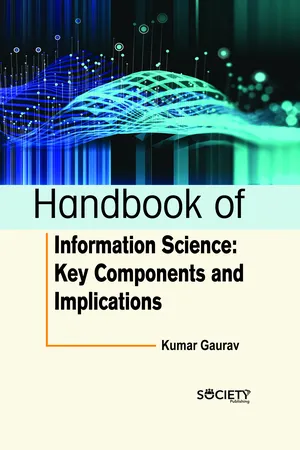
- 328 pages
- English
- PDF
- Only available on web
Handbook of information science: Key components and implications
About This Book
Information science is an interdisciplinary field that investigates the nature, properties, and behavior of information. It focuses on understanding how information is organized, processed, and communicated, as well as the impact it has on individuals, organizations, and society. Information scientists employ a range of theoretical and practical approaches, drawing from fields such as computer science, linguistics, psychology, sociology, and library science. They study topics like information retrieval, data mining, knowledge management, human-computer interaction, and information ethics. Information science plays a crucial role in facilitating the efficient and effective flow of information, enabling individuals and organizations to make informed decisions, innovate, and adapt in a rapidly changing information landscape. It also addresses broader societal issues such as information privacy, information access, and the ethical implications of information use. Overall, information science is at the forefront of understanding, harnessing, and leveraging the power of information in the modern world. The "Handbook of Information Science: Key Components and Implications" is an indispensable resource that comprehensively explores the field of information science. This handbook is tailored for researchers, practitioners, and students seeking a comprehensive understanding of the key aspects and implications of information science. It covers a wide range of topics, including the foundational concepts of information science, fundamental theories and frameworks, information generation, organization, and retrieval techniques, information systems and technologies, data, information, and knowledge management practices, information policy and ethics, the societal impact of information science, and future trends in the field. With its authoritative insights and practical applications, this handbook serves as a valuable guide for anyone seeking to navigate the complexities of information science, empowering readers to make informed decisions and contribute to the ever-evolving landscape of information management and society at large.
Frequently asked questions
Information
Table of contents
- Cover
- Half Title
- Title Page
- Copyright
- About The Author
- Table of Contents
- List of Figures
- List of Tables
- List of Abbreviations
- Preface
- Chapter 1: Introduction To Information Science
- Chapter 2: Fundamental Concepts And Theories
- Chapter 3: Organization Of Information And The Information Retrieval System
- Chapter 4: Information Systems And Information Technologies
- Chapter 5: Data, Information, And Knowledge Management
- Chapter 6: Information Ethics In The 21st Century
- Chapter 7: Information Science And Society
- Chapter 8: Future Of Information Science
- Index
- Back Cover